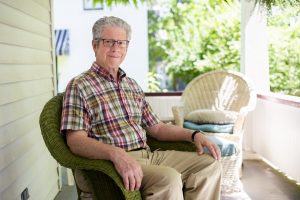
Richard Osborne wanted to buy a house in the mountains of North Carolina. Instead, he found himself six states north, mountain-less, surrounded by a lake, an Amphitheater and rows of 19th-century houses.
Osborne — a newly appointed member of Chautauqua Institution Board of Trustees — was enamored with the arts and intellectual stimulation he found on the grounds, and has returned every season since.
After three decades, Osborne retired from North Carolina-based Duke Energy Corporation, where he served as chief financial officer and chief risk officer. Aside from Chautauqua’s board of trustees, Osborne serves on Charlotte Ballet’s board of trustees and is president of the Chautauqua Dance Circle.
How did you discover Chautauqua?
I was invited to Chautauqua by friends of mine who had been coming for many years. At that point, I came for four weeks a season and stayed at the same house. I actually knew a number of people who came to Chautauqua, but that was the first time I could come myself — that was in 2011.
I loved it as soon as I got here. … It’s just a different kind of summer, and it has all the kinds of activities I like: intellectually challenging activities and entertaining and artistic kinds of activities. It was clearly something I was going to pursue.
What’s your Chautauqua elevator pitch?
I think the shorthand description I’ve heard — and I won’t take credit for this — is that it’s summer camp for geeks. I think that’s a good description; it is summer camp and there are activities and there is relaxation and there is an opportunity to do as much as you want.
I think that’s part of the chemistry, or the magic of Chautauqua; it does permit you to create the program that you want and personalize it in a very real and significant way.
What does being a trustee mean to you? How do you perceive your role on the board?
I was very honored; I was very flattered when they approached me about being on the board, and I’ve served on other boards and I still serve on other boards, so I’m generally familiar with the responsibilities and the aspects that are enjoyable and challenging, and the aspects that are not so enjoyable.
This is a different kind of board because Chautauqua is so different; this is, to some large part, like most nonprofit organizations are but it has a wholly-owned, for-profit entity — the hotel. It also has aspects that are really much more like a town, or a city, or a municipal operation than like a traditional nonprofit. So, it is very different in some respects than other boards I’ve worked.
I was surprised and flattered to be approached, and I have really found it very interesting. The board is engaged — in my mind — the way a board should be, looking at oversight and strategy and leaving the daily operations … to President Michael E. Hill and his team. I think that’s a healthy way for a board to operate.
I have been very pleased with the level of discussion and engagement by the other trustees and the really positive, constructive spirit with which people approach the challenges and the questions, because there are serious challenges facing the Institution.
Our challenge as Chautauquans and as the board is to guide the development of the Institution.
How do you think 150 Forward accomplishes or aids the board’s work?
I think the strategic plan is the most obvious and specific result of those considerations. That is the road map that the trustees have come up with after querying the community and Chautuaquans.
And that was a very thorough and arduous process that (Strategic Planning Working Group Chair) Laura Currie led and that is now being implemented. I think the strategic plan really is the road map forward.
It will change; there are some things in there that will probably prove to be impractical or wrong. That’s the way it is with any strategic plan — it’s a plan, but you go forward and you start to implement and you figure out what’s really right and what’s somewhat wrong or sometimes really significantly wrong.
We’ll do that, and I’m confident that we’ll make changes, and hopefully we’ll make them in a timely and appropriate way.
How much have you been involved with the strategic plan?
Well I wasn’t on the board for most of the development; I only came on the board in the final stages of the strategic plan, so most of it was pretty vague. Now, coming to Chautauqua I was aware that there was a strategic plan being developed, and I remember going to (meetings).
But when I came on the board it was mostly done; there was fine-tuning up until the very end, up until it was put-to-bed and printed. I really was impressed with the degree of ownership that the board had for it, the seriousness with which the trustees approached it, and of course bringing (Chief of Staff and Vice President of Strategic Initiatives) Shannon Rozner on, really specifically for the implementation, was I think a sign of how important Michael and his team view getting this right.
How do you think your professional experience is going to translate to your committee assignment?
My professional experience is mostly in finance and accounting, and then to some extent in public policy and regulatory policy and lobbying. I think a lot of that is directly applicable here; Chautauqua is a public entity in so many respects and so etched in the political world, in New York, in Chautauqua County, in the lake.
The whole challenge with Chautauqua Lake is to some extent constrained and guided by the legal and regulatory world in which we live. … You’re dealing with what appears to be red tape, and it’s well-meaning red tape, but it’s red tape.
I worked for a very large utility for 33 years, so I know about red tape.
And then on the financial end, I do think Chautauqua has financial challenges. We’re fortunate in that there’s no burning platform right now and that … everything is going fine. … Yet if you look at the financial and demographic projections, if you just keep doing what we’re doing, you’ll go right off a cliff — well, you’ll just go down a slow grade.
So I think the challenge we have is to create a sense of urgency — not a sense of alarm. There’s no reason to be alarmed but there is a reason to address the situation with urgency and figure out how to preserve the best aspects of what we’re doing and enhance them in ways that are more relevant for the world we live in.
And I think that’s part of what the strategic plan is trying (to do), and it’s trying to do it in a thoughtful but urgent way, and I think that’s appropriate — that’s exactly what we should be doing.
What are your hopes for your first full season as a trustee?
I think we’re having a good launch of the strategic plan; I hope that continues to go well and unfolds in a way where Chautauquans recognize it as reflecting what they told the committee and the board of trustees, and that the trustees tried very hard to incorporate that in a cohesive plan.
The success of the plan will depend upon the community’s willingness to grab it and say, “this is our plan, and this is where we want to go.”

